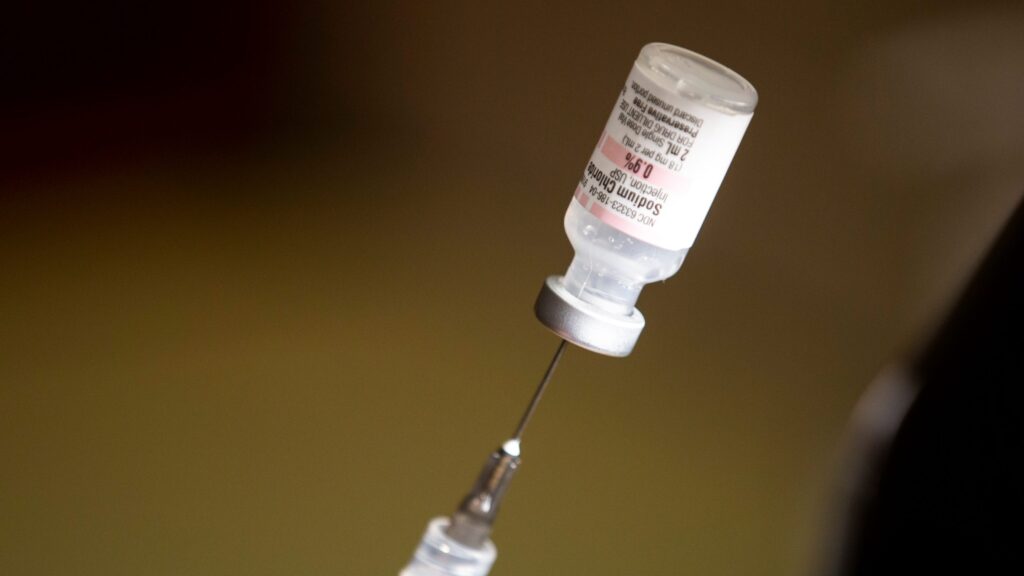The Oregon Health Authority and public health officials Thursday urged Oregonians to get vaccinated to prevent the spread of respiratory illnesses such as COVID-19, the flu, RSV, whooping cough and measles during the traditional virus season.
“As cooler weather heads our way, and people begin to gather more indoors, respiratory viruses may increase,” said OHA Medical Director for Respiratory Viral Pathogens Melissa Sutton.
Winter, fall surge of COVID-19 and the flu likely
Sutton said she “feels confident” in expecting a fall/winter surge of COVID-19 cases, based on data over the last five years. The intensity and exactly when surges will occur varies.
“Right now, we’re in a late summer surge and we’re coming out of that,” she said. “So I think we’ll likely not see that until later into the winter.”
Influenza is commonly introduced when there are “hot spots” in certain areas, likely when there are a lot of travelers moving in and out of the area. Influenza enters into one region first, then spreads throughout the other areas.
There are updated seasonal vaccines available in some areas for COVID-19 and influenza recommended for all people six months of age and older.
Oregonians can contact their healthcare provider, or search for a clinic at vaccinefinder.org, by calling 211 or visiting 211info.org.
Seasonal increase in RSV hospitalizations, deaths is certain
“RSV is the most common cause of hospitalizations among infants in the United States,” Sutton says.
“Every respiratory season, we see a dramatic increase in the number of hospitalizations and deaths caused by respiratory viruses,” she said. “And we cannot always predict who will become severely ill.”
Mothers can protect their children from the severe effects of RSV by either getting a maternal RSV vaccine during pregnancy or an injectable monoclonal antibody called Nirsevimab. Sutton said only one of these options is necessary.
The maternal vaccine reduces the risk of severe outcomes in infants caused by RSV, including low oxygen in the blood, a need for mechanical ventilation and admission into an intensive care unit, according to the Centers for Disease Control and Prevention.
Nirsevimab protects infants and young children from severe RSV. “Nirsevimab does not provide long-term immunity to RSV disease but provides protection to infants when they are most at risk of getting severe RSV disease,” according to the CDC.
An RSV vaccine also is available for adults 60 years or older have underlying medical conditions, and all adults aged 75 years or older.
‘Very effective vaccines’
Measles and pertussis are two of the most contagious diseases known, said Multnomah County Health Department Officer Richard Bruno, and have been on the rise this year in Oregon.
“But they also have very effective vaccines,” Bruno said.
There have been 31 measles cases this year, which is the biggest outbreak in Oregon since 1991, Dr. Bruno said. In 2023, there was just a single case of measles in the state, according to OHA’s Disease Report.
“All of these cases have been unvaccinated people,” Bruno said. “Unfortunately, two needed hospitalization.”
Bruno said the outbreak may be diminishing since the recent case was confirmed in mid-August. Now that kids are back in school, however, there may be a possibility of additional cases, he said.
Oregon also has seen a spike in pertussis this year, with 560 cases, which is 534 more than in 2023, according to OHA’s Disease Report.
“Pertussis usually begins mild. Cold-like symptoms can be missed at first,” Bruno said. Eventually, it progresses into uncontrollable coughing. Babies, in particular, are at a high risk for complications including struggling to breathe.
“Pertussis is a bacteria,” Dr. Bruno said. “So it’s important to see your healthcare provider if you have a cough that’s not getting better” so antibiotics can be prescribed.
Most people get pertussis vaccinations when they’re children, the last dose typically administered around 12 years of age. Many people get updated vaccines every 10 years as part of the tetanus booster, Bruno said.
Protection can wane over time, but people who get sick will likely experience less severe symptoms, he said.
How to protect yourself during the traditional respiratory infection season
“Immunizations act as our best defense against severe disease, which can affect anyone,” Sutton said.
COVID-19, influenza, RSV, pertussis and measles are all spread when somebody who is sick coughs or sneezes.
People with an increased risk of severe COVID-19 infection include the elderly, pregnant women and people with underlying medical conditions.
People with an increased risk for severe influenza include all those same groups, as well as children under five, said Sarah Laiosa, public health officer for Malheur and Harney counties.
Laiosa noted there is “an incredible amount of disinformation’ and encouraged Oregonians to ask their healthcare provider any questions they might have. “They want to hear from you and they want to inform and empower you,” she said.
“Compared with other states, we (Oregon) have among the lowest number of hospital beds per person in the nation,” Laioa said. “That means that any increase in respiratory diseases can quickly fill our emergency rooms and hospitals, slowing care for all and putting incredible pressure on our dedicated frontline healthcare workers.”
Strategies to reduce the risk of getting a respiratory virus
In addition to vaccination, Sutton said Oregonians can to help reduce the risk of contracting a respiratory virus by:
- Practicing hand hygiene and coughing etiquette
- Improving ventilation
- Staying home when sick
- Wearing a mask
- Avoiding crowded indoor gatherings when sick
Oregonians can monitor respiratory virus data through the OHA analytics portfolio
Alexander Banks is an AAJA-SPJ reporting intern at the Statesman Journal. Reach him at abanks@statesmanjournal.com

